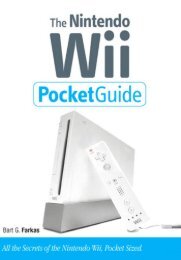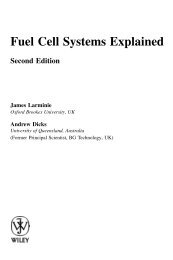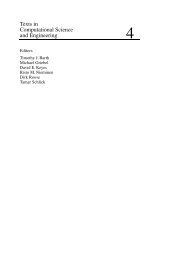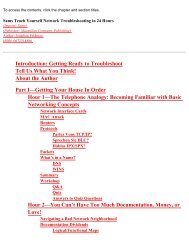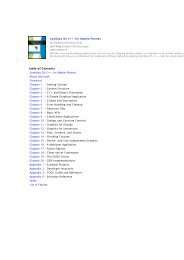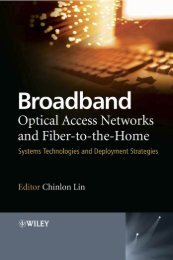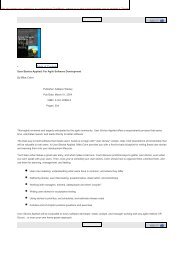- Page 2:
TELECOMMUNICATIONS AND DATA COMMUNI
- Page 10:
TELECOMMUNICATIONS AND DATA COMMUNI
- Page 14:
To Margaret, For whom my love and d
- Page 20:
viii CONTENTS 1.5.2 Digital Bit Str
- Page 24:
x CONTENTS 2.7.10 Security / 74 2.7
- Page 28:
xii CONTENTS 4.1.4 Fax-On-Demand /
- Page 32:
xiv CONTENTS 5.5.1.6 Tie Lines and
- Page 36:
xvi CONTENTS 7.4.1 T-Carrier Concep
- Page 40:
xviii CONTENTS 8.2.4 Media Access C
- Page 44:
xx CONTENTS 9.2.6 SONET/SDH Hardwar
- Page 48:
xxii CONTENTS 11.8 Cordless Telepho
- Page 52:
xxiv CONTENTS 13.7.2 Application-Le
- Page 56:
xxvi CONTENTS 15.4 Number Portabili
- Page 60:
xxviii PREFACE often moves in packe
- Page 64:
xxx PREFACE concept and in terms of
- Page 70:
ACKNOWLEDGMENTS I am a hoarder of t
- Page 74:
ACKNOWLEDGMENTS xxxv proud. I can o
- Page 80:
xxxviii ABOUT THE AUTHOR for contin
- Page 84:
2 FUNDAMENTALS OF THE TECHNOLOGY: C
- Page 88:
4 FUNDAMENTALS OF THE TECHNOLOGY: C
- Page 92:
6 FUNDAMENTALS OF THE TECHNOLOGY: C
- Page 96:
8 FUNDAMENTALS OF THE TECHNOLOGY: C
- Page 100:
10 FUNDAMENTALS OF THE TECHNOLOGY:
- Page 104:
12 FUNDAMENTALS OF THE TECHNOLOGY:
- Page 108:
14 FUNDAMENTALS OF THE TECHNOLOGY:
- Page 112:
16 FUNDAMENTALS OF THE TECHNOLOGY:
- Page 116:
18 FUNDAMENTALS OF THE TECHNOLOGY:
- Page 120:
20 FUNDAMENTALS OF THE TECHNOLOGY:
- Page 124:
22 FUNDAMENTALS OF THE TECHNOLOGY:
- Page 128:
24 FUNDAMENTALS OF THE TECHNOLOGY:
- Page 132:
26 FUNDAMENTALS OF THE TECHNOLOGY:
- Page 136:
28 FUNDAMENTALS OF THE TECHNOLOGY:
- Page 140:
30 FUNDAMENTALS OF THE TECHNOLOGY:
- Page 144:
32 FUNDAMENTALS OF THE TECHNOLOGY:
- Page 148:
34 FUNDAMENTALS OF THE TECHNOLOGY:
- Page 152:
36 FUNDAMENTALS OF THE TECHNOLOGY:
- Page 156:
38 FUNDAMENTALS OF TRANSMISSION SYS
- Page 160:
40 FUNDAMENTALS OF TRANSMISSION SYS
- Page 164:
42 FUNDAMENTALS OF TRANSMISSION SYS
- Page 168:
44 FUNDAMENTALS OF TRANSMISSION SYS
- Page 172:
46 FUNDAMENTALS OF TRANSMISSION SYS
- Page 176:
48 FUNDAMENTALS OF TRANSMISSION SYS
- Page 180:
50 FUNDAMENTALS OF TRANSMISSION SYS
- Page 184:
52 FUNDAMENTALS OF TRANSMISSION SYS
- Page 188:
54 FUNDAMENTALS OF TRANSMISSION SYS
- Page 192:
56 FUNDAMENTALS OF TRANSMISSION SYS
- Page 196:
58 FUNDAMENTALS OF TRANSMISSION SYS
- Page 200:
60 FUNDAMENTALS OF TRANSMISSION SYS
- Page 204:
62 FUNDAMENTALS OF TRANSMISSION SYS
- Page 208:
64 FUNDAMENTALS OF TRANSMISSION SYS
- Page 212:
66 FUNDAMENTALS OF TRANSMISSION SYS
- Page 216:
68 FUNDAMENTALS OF TRANSMISSION SYS
- Page 220:
70 FUNDAMENTALS OF TRANSMISSION SYS
- Page 224:
72 FUNDAMENTALS OF TRANSMISSION SYS
- Page 228:
74 FUNDAMENTALS OF TRANSMISSION SYS
- Page 232:
76 FUNDAMENTALS OF TRANSMISSION SYS
- Page 236:
78 FUNDAMENTALS OF TRANSMISSION SYS
- Page 240:
80 FUNDAMENTALS OF TRANSMISSION SYS
- Page 244:
82 FUNDAMENTALS OF TRANSMISSION SYS
- Page 248:
84 FUNDAMENTALS OF TRANSMISSION SYS
- Page 252:
86 FUNDAMENTALS OF TRANSMISSION SYS
- Page 256:
88 FUNDAMENTALS OF TRANSMISSION SYS
- Page 260:
90 FUNDAMENTALS OF TRANSMISSION SYS
- Page 264:
92 FUNDAMENTALS OF TRANSMISSION SYS
- Page 268:
94 FUNDAMENTALS OF TRANSMISSION SYS
- Page 272:
96 FUNDAMENTALS OF TRANSMISSION SYS
- Page 276:
98 FUNDAMENTALS OF TRANSMISSION SYS
- Page 280:
100 FUNDAMENTALS OF TRANSMISSION SY
- Page 284:
102 VOICE COMMUNICATIONS SYSTEMS: K
- Page 288:
104 VOICE COMMUNICATIONS SYSTEMS: K
- Page 292:
106 VOICE COMMUNICATIONS SYSTEMS: K
- Page 296:
108 VOICE COMMUNICATIONS SYSTEMS: K
- Page 300:
110 VOICE COMMUNICATIONS SYSTEMS: K
- Page 304:
112 VOICE COMMUNICATIONS SYSTEMS: K
- Page 308:
114 VOICE COMMUNICATIONS SYSTEMS: K
- Page 312:
116 VOICE COMMUNICATIONS SYSTEMS: K
- Page 316:
118 VOICE COMMUNICATIONS SYSTEMS: K
- Page 320:
120 VOICE COMMUNICATIONS SYSTEMS: K
- Page 324:
122 VOICE COMMUNICATIONS SYSTEMS: K
- Page 328:
124 VOICE COMMUNICATIONS SYSTEMS: K
- Page 332:
126 VOICE COMMUNICATIONS SYSTEMS: K
- Page 336:
128 VOICE COMMUNICATIONS SYSTEMS: K
- Page 340:
130 VOICE COMMUNICATIONS SYSTEMS: K
- Page 344:
132 VOICE COMMUNICATIONS SYSTEMS: K
- Page 348:
134 VOICE COMMUNICATIONS SYSTEMS: K
- Page 352:
136 VOICE COMMUNICATIONS SYSTEMS: K
- Page 356:
138 VOICE COMMUNICATIONS SYSTEMS: K
- Page 360:
140 VOICE COMMUNICATIONS SYSTEMS: K
- Page 364:
142 VOICE COMMUNICATIONS SYSTEMS: K
- Page 368:
144 VOICE COMMUNICATIONS SYSTEMS: K
- Page 372:
146 VOICE COMMUNICATIONS SYSTEMS: K
- Page 376:
148 VOICE COMMUNICATIONS SYSTEMS: K
- Page 380:
150 VOICE COMMUNICATIONS SYSTEMS: K
- Page 384:
152 VOICE COMMUNICATIONS SYSTEMS: K
- Page 388:
CHAPTER 4 MESSAGING SYSTEMS Telecom
- Page 392:
156 MESSAGING SYSTEMS 4.1 FACSIMILE
- Page 396:
158 MESSAGING SYSTEMS TABLE 4.1 Fac
- Page 400:
160 MESSAGING SYSTEMS serves to red
- Page 404:
162 MESSAGING SYSTEMS To resolve th
- Page 408:
164 MESSAGING SYSTEMS rather than o
- Page 412:
166 MESSAGING SYSTEMS The inherent
- Page 416:
168 MESSAGING SYSTEMS 4.1.8 Fax App
- Page 420:
170 MESSAGING SYSTEMS in individual
- Page 424:
172 MESSAGING SYSTEMS Seattle New Y
- Page 428:
174 MESSAGING SYSTEMS to the develo
- Page 432:
176 MESSAGING SYSTEMS solace in the
- Page 436:
178 MESSAGING SYSTEMS in 1850, as b
- Page 440:
180 MESSAGING SYSTEMS online servic
- Page 444:
182 MESSAGING SYSTEMS over a VPN (V
- Page 448:
184 MESSAGING SYSTEMS • Video typ
- Page 452:
186 MESSAGING SYSTEMS Database Serv
- Page 456:
188 MESSAGING SYSTEMS September 200
- Page 460:
190 MESSAGING SYSTEMS • Text Base
- Page 464:
192 MESSAGING SYSTEMS (i.e., websit
- Page 468:
194 MESSAGING SYSTEMS mitigate disp
- Page 472:
196 MESSAGING SYSTEMS technology, a
- Page 476:
198 MESSAGING SYSTEMS 4. Glossbrenn
- Page 480:
CHAPTER 5 PUBLIC SWITCHED TELEPHONE
- Page 484:
202 PUBLIC SWITCHED TELEPHONE NETWO
- Page 488:
204 PUBLIC SWITCHED TELEPHONE NETWO
- Page 492:
206 PUBLIC SWITCHED TELEPHONE NETWO
- Page 496:
208 PUBLIC SWITCHED TELEPHONE NETWO
- Page 500:
210 PUBLIC SWITCHED TELEPHONE NETWO
- Page 504:
212 PUBLIC SWITCHED TELEPHONE NETWO
- Page 508:
214 PUBLIC SWITCHED TELEPHONE NETWO
- Page 512:
216 PUBLIC SWITCHED TELEPHONE NETWO
- Page 516:
218 PUBLIC SWITCHED TELEPHONE NETWO
- Page 520:
220 PUBLIC SWITCHED TELEPHONE NETWO
- Page 524:
222 PUBLIC SWITCHED TELEPHONE NETWO
- Page 528:
224 PUBLIC SWITCHED TELEPHONE NETWO
- Page 532:
226 PUBLIC SWITCHED TELEPHONE NETWO
- Page 536:
228 PUBLIC SWITCHED TELEPHONE NETWO
- Page 540:
230 PUBLIC SWITCHED TELEPHONE NETWO
- Page 544:
232 PUBLIC SWITCHED TELEPHONE NETWO
- Page 548:
234 PUBLIC SWITCHED TELEPHONE NETWO
- Page 552:
236 PUBLIC SWITCHED TELEPHONE NETWO
- Page 556:
238 PUBLIC SWITCHED TELEPHONE NETWO
- Page 560:
240 PUBLIC SWITCHED TELEPHONE NETWO
- Page 564:
242 PUBLIC SWITCHED TELEPHONE NETWO
- Page 568:
244 PUBLIC SWITCHED TELEPHONE NETWO
- Page 572:
246 PUBLIC SWITCHED TELEPHONE NETWO
- Page 576:
248 FUNDAMENTALS OF DATA COMMUNICAT
- Page 580:
250 FUNDAMENTALS OF DATA COMMUNICAT
- Page 584:
252 FUNDAMENTALS OF DATA COMMUNICAT
- Page 588:
254 FUNDAMENTALS OF DATA COMMUNICAT
- Page 592:
256 FUNDAMENTALS OF DATA COMMUNICAT
- Page 596:
258 FUNDAMENTALS OF DATA COMMUNICAT
- Page 600:
260 FUNDAMENTALS OF DATA COMMUNICAT
- Page 604:
262 FUNDAMENTALS OF DATA COMMUNICAT
- Page 608:
264 FUNDAMENTALS OF DATA COMMUNICAT
- Page 612:
266 FUNDAMENTALS OF DATA COMMUNICAT
- Page 616:
268 FUNDAMENTALS OF DATA COMMUNICAT
- Page 620:
270 FUNDAMENTALS OF DATA COMMUNICAT
- Page 624:
272 FUNDAMENTALS OF DATA COMMUNICAT
- Page 628:
274 FUNDAMENTALS OF DATA COMMUNICAT
- Page 632:
276 FUNDAMENTALS OF DATA COMMUNICAT
- Page 636:
278 FUNDAMENTALS OF DATA COMMUNICAT
- Page 640:
280 FUNDAMENTALS OF DATA COMMUNICAT
- Page 644:
282 FUNDAMENTALS OF DATA COMMUNICAT
- Page 648:
284 FUNDAMENTALS OF DATA COMMUNICAT
- Page 652:
286 FUNDAMENTALS OF DATA COMMUNICAT
- Page 656:
288 FUNDAMENTALS OF DATA COMMUNICAT
- Page 660:
290 FUNDAMENTALS OF DATA COMMUNICAT
- Page 664:
292 FUNDAMENTALS OF DATA COMMUNICAT
- Page 668:
CHAPTER 7 CONVENTIONAL DIGITAL AND
- Page 672:
296 CONVENTIONAL DIGITAL AND DATA N
- Page 676:
298 CONVENTIONAL DIGITAL AND DATA N
- Page 680:
300 CONVENTIONAL DIGITAL AND DATA N
- Page 684:
302 CONVENTIONAL DIGITAL AND DATA N
- Page 688:
304 CONVENTIONAL DIGITAL AND DATA N
- Page 692:
306 CONVENTIONAL DIGITAL AND DATA N
- Page 696:
308 CONVENTIONAL DIGITAL AND DATA N
- Page 700:
310 CONVENTIONAL DIGITAL AND DATA N
- Page 704:
312 CONVENTIONAL DIGITAL AND DATA N
- Page 708:
314 CONVENTIONAL DIGITAL AND DATA N
- Page 712:
316 CONVENTIONAL DIGITAL AND DATA N
- Page 716:
318 CONVENTIONAL DIGITAL AND DATA N
- Page 720:
320 CONVENTIONAL DIGITAL AND DATA N
- Page 724:
322 CONVENTIONAL DIGITAL AND DATA N
- Page 728:
324 CONVENTIONAL DIGITAL AND DATA N
- Page 732:
326 CONVENTIONAL DIGITAL AND DATA N
- Page 736:
328 CONVENTIONAL DIGITAL AND DATA N
- Page 740:
330 CONVENTIONAL DIGITAL AND DATA N
- Page 744:
332 CONVENTIONAL DIGITAL AND DATA N
- Page 748:
334 CONVENTIONAL DIGITAL AND DATA N
- Page 752:
336 CONVENTIONAL DIGITAL AND DATA N
- Page 756:
338 CONVENTIONAL DIGITAL AND DATA N
- Page 760:
340 CONVENTIONAL DIGITAL AND DATA N
- Page 764:
342 CONVENTIONAL DIGITAL AND DATA N
- Page 768:
344 CONVENTIONAL DIGITAL AND DATA N
- Page 772:
346 CONVENTIONAL DIGITAL AND DATA N
- Page 776:
348 CONVENTIONAL DIGITAL AND DATA N
- Page 780:
350 CONVENTIONAL DIGITAL AND DATA N
- Page 784:
352 CONVENTIONAL DIGITAL AND DATA N
- Page 788:
354 LOCAL AREA NETWORKS: CONNECTIVI
- Page 792:
356 LOCAL AREA NETWORKS: CONNECTIVI
- Page 796:
358 LOCAL AREA NETWORKS: CONNECTIVI
- Page 800:
360 LOCAL AREA NETWORKS: CONNECTIVI
- Page 804:
362 LOCAL AREA NETWORKS: CONNECTIVI
- Page 808:
364 LOCAL AREA NETWORKS: CONNECTIVI
- Page 812:
366 LOCAL AREA NETWORKS: CONNECTIVI
- Page 816:
368 LOCAL AREA NETWORKS: CONNECTIVI
- Page 820:
370 LOCAL AREA NETWORKS: CONNECTIVI
- Page 824:
372 LOCAL AREA NETWORKS: CONNECTIVI
- Page 828:
374 LOCAL AREA NETWORKS: CONNECTIVI
- Page 832:
376 LOCAL AREA NETWORKS: CONNECTIVI
- Page 836:
378 LOCAL AREA NETWORKS: CONNECTIVI
- Page 840:
380 LOCAL AREA NETWORKS: CONNECTIVI
- Page 844:
382 LOCAL AREA NETWORKS: CONNECTIVI
- Page 848:
384 LOCAL AREA NETWORKS: CONNECTIVI
- Page 852:
386 LOCAL AREA NETWORKS: CONNECTIVI
- Page 856:
388 LOCAL AREA NETWORKS: CONNECTIVI
- Page 860:
390 LOCAL AREA NETWORKS: CONNECTIVI
- Page 864:
392 LOCAL AREA NETWORKS: CONNECTIVI
- Page 868:
394 LOCAL AREA NETWORKS: CONNECTIVI
- Page 872:
396 LOCAL AREA NETWORKS: CONNECTIVI
- Page 876:
398 LOCAL AREA NETWORKS: CONNECTIVI
- Page 880:
400 LOCAL AREA NETWORKS: CONNECTIVI
- Page 884:
402 LOCAL AREA NETWORKS: CONNECTIVI
- Page 888:
404 LOCAL AREA NETWORKS: CONNECTIVI
- Page 892:
406 LOCAL AREA NETWORKS: CONNECTIVI
- Page 896:
408 LOCAL AREA NETWORKS: CONNECTIVI
- Page 900:
410 LOCAL AREA NETWORKS: CONNECTIVI
- Page 904:
412 LOCAL AREA NETWORKS: CONNECTIVI
- Page 908:
414 LOCAL AREA NETWORKS: CONNECTIVI
- Page 912:
416 LOCAL AREA NETWORKS: CONNECTIVI
- Page 916:
418 LOCAL AREA NETWORKS: CONNECTIVI
- Page 920:
420 LOCAL AREA NETWORKS: CONNECTIVI
- Page 924:
422 BROADBAND NETWORK INFRASTRUCTUR
- Page 928:
424 BROADBAND NETWORK INFRASTRUCTUR
- Page 932:
426 BROADBAND NETWORK INFRASTRUCTUR
- Page 936:
428 BROADBAND NETWORK INFRASTRUCTUR
- Page 940:
430 BROADBAND NETWORK INFRASTRUCTUR
- Page 944:
432 BROADBAND NETWORK INFRASTRUCTUR
- Page 948:
434 BROADBAND NETWORK INFRASTRUCTUR
- Page 952:
436 BROADBAND NETWORK INFRASTRUCTUR
- Page 956:
438 BROADBAND NETWORK INFRASTRUCTUR
- Page 960:
440 BROADBAND NETWORK INFRASTRUCTUR
- Page 964:
442 BROADBAND NETWORK INFRASTRUCTUR
- Page 968:
444 BROADBAND NETWORK INFRASTRUCTUR
- Page 972:
446 BROADBAND NETWORK INFRASTRUCTUR
- Page 976:
448 BROADBAND NETWORK INFRASTRUCTUR
- Page 980:
450 BROADBAND NETWORK INFRASTRUCTUR
- Page 984:
452 BROADBAND NETWORK INFRASTRUCTUR
- Page 988:
454 BROADBAND NETWORK INFRASTRUCTUR
- Page 992:
456 BROADBAND NETWORK INFRASTRUCTUR
- Page 996:
458 BROADBAND NETWORK INFRASTRUCTUR
- Page 1000:
460 BROADBAND NETWORK INFRASTRUCTUR
- Page 1004:
462 BROADBAND NETWORK INFRASTRUCTUR
- Page 1008:
464 BROADBAND NETWORK INFRASTRUCTUR
- Page 1012:
466 BROADBAND NETWORK INFRASTRUCTUR
- Page 1016:
468 BROADBAND NETWORK INFRASTRUCTUR
- Page 1020:
470 BROADBAND NETWORK INFRASTRUCTUR
- Page 1024:
472 BROADBAND NETWORK INFRASTRUCTUR
- Page 1028:
474 BROADBAND NETWORK INFRASTRUCTUR
- Page 1032:
476 BROADBAND NETWORK INFRASTRUCTUR
- Page 1036:
478 BROADBAND NETWORK INFRASTRUCTUR
- Page 1040:
480 BROADBAND NETWORK INFRASTRUCTUR
- Page 1044:
482 BROADBAND NETWORK INFRASTRUCTUR
- Page 1048:
484 BROADBAND NETWORK INFRASTRUCTUR
- Page 1052:
486 BROADBAND NETWORK INFRASTRUCTUR
- Page 1056:
488 BROADBAND NETWORK INFRASTRUCTUR
- Page 1060:
490 BROADBAND NETWORK INFRASTRUCTUR
- Page 1064:
492 BROADBAND NETWORK INFRASTRUCTUR
- Page 1068:
494 BROADBAND NETWORK INFRASTRUCTUR
- Page 1072:
496 BROADBAND NETWORK SERVICES Figu
- Page 1076:
498 BROADBAND NETWORK SERVICES dete
- Page 1080:
500 BROADBAND NETWORK SERVICES T1s
- Page 1084:
502 BROADBAND NETWORK SERVICES of a
- Page 1088:
504 BROADBAND NETWORK SERVICES begi
- Page 1092:
506 BROADBAND NETWORK SERVICES •
- Page 1096:
508 BROADBAND NETWORK SERVICES 10.1
- Page 1100:
510 BROADBAND NETWORK SERVICES use
- Page 1104:
512 BROADBAND NETWORK SERVICES TABL
- Page 1108:
514 BROADBAND NETWORK SERVICES •
- Page 1112:
516 BROADBAND NETWORK SERVICES ably
- Page 1116:
518 BROADBAND NETWORK SERVICES intr
- Page 1120:
520 BROADBAND NETWORK SERVICES (PRI
- Page 1124:
522 BROADBAND NETWORK SERVICES form
- Page 1128:
524 BROADBAND NETWORK SERVICES User
- Page 1132:
526 BROADBAND NETWORK SERVICES Figu
- Page 1136:
528 BROADBAND NETWORK SERVICES Figu
- Page 1140:
TABLE 10.4 ATM Adaptation Layer (AA
- Page 1144:
532 BROADBAND NETWORK SERVICES •
- Page 1148:
534 BROADBAND NETWORK SERVICES word
- Page 1152:
536 BROADBAND NETWORK SERVICES The
- Page 1156:
538 BROADBAND NETWORK SERVICES can
- Page 1160:
540 BROADBAND NETWORK SERVICES in 1
- Page 1164:
542 BROADBAND NETWORK SERVICES AP E
- Page 1168:
544 BROADBAND NETWORK SERVICES Sign
- Page 1172:
546 BROADBAND NETWORK SERVICES •
- Page 1176:
548 BROADBAND NETWORK SERVICES 9. H
- Page 1180:
CHAPTER 11 WIRELESS NETWORKING: EMP
- Page 1184:
552 WIRELESS NETWORKING: EMPHASIS O
- Page 1188:
554 WIRELESS NETWORKING: EMPHASIS O
- Page 1192:
556 WIRELESS NETWORKING: EMPHASIS O
- Page 1196:
558 WIRELESS NETWORKING: EMPHASIS O
- Page 1200:
560 WIRELESS NETWORKING: EMPHASIS O
- Page 1204:
562 WIRELESS NETWORKING: EMPHASIS O
- Page 1208:
564 WIRELESS NETWORKING: EMPHASIS O
- Page 1212:
566 WIRELESS NETWORKING: EMPHASIS O
- Page 1216:
568 WIRELESS NETWORKING: EMPHASIS O
- Page 1220:
570 WIRELESS NETWORKING: EMPHASIS O
- Page 1224:
572 WIRELESS NETWORKING: EMPHASIS O
- Page 1228:
574 WIRELESS NETWORKING: EMPHASIS O
- Page 1232:
576 WIRELESS NETWORKING: EMPHASIS O
- Page 1236:
578 WIRELESS NETWORKING: EMPHASIS O
- Page 1240:
580 WIRELESS NETWORKING: EMPHASIS O
- Page 1244:
582 WIRELESS NETWORKING: EMPHASIS O
- Page 1248:
584 WIRELESS NETWORKING: EMPHASIS O
- Page 1252:
586 WIRELESS NETWORKING: EMPHASIS O
- Page 1256:
588 WIRELESS NETWORKING: EMPHASIS O
- Page 1260:
590 WIRELESS NETWORKING: EMPHASIS O
- Page 1264:
592 WIRELESS NETWORKING: EMPHASIS O
- Page 1268:
594 WIRELESS NETWORKING: EMPHASIS O
- Page 1272:
596 WIRELESS NETWORKING: EMPHASIS O
- Page 1276:
598 WIRELESS NETWORKING: EMPHASIS O
- Page 1280:
CHAPTER 12 VIDEO AND MULTIMEDIA NET
- Page 1284:
602 VIDEO AND MULTIMEDIA NETWORKING
- Page 1288:
604 VIDEO AND MULTIMEDIA NETWORKING
- Page 1292:
606 VIDEO AND MULTIMEDIA NETWORKING
- Page 1296:
608 VIDEO AND MULTIMEDIA NETWORKING
- Page 1300:
610 VIDEO AND MULTIMEDIA NETWORKING
- Page 1304:
612 VIDEO AND MULTIMEDIA NETWORKING
- Page 1308:
614 VIDEO AND MULTIMEDIA NETWORKING
- Page 1312:
616 VIDEO AND MULTIMEDIA NETWORKING
- Page 1316:
618 VIDEO AND MULTIMEDIA NETWORKING
- Page 1320:
620 VIDEO AND MULTIMEDIA NETWORKING
- Page 1324:
622 VIDEO AND MULTIMEDIA NETWORKING
- Page 1328:
624 VIDEO AND MULTIMEDIA NETWORKING
- Page 1332:
626 VIDEO AND MULTIMEDIA NETWORKING
- Page 1336:
628 VIDEO AND MULTIMEDIA NETWORKING
- Page 1340:
630 THE INTERNET AND WORLD WIDE WEB
- Page 1344:
632 THE INTERNET AND WORLD WIDE WEB
- Page 1348:
634 THE INTERNET AND WORLD WIDE WEB
- Page 1352:
636 THE INTERNET AND WORLD WIDE WEB
- Page 1356:
638 THE INTERNET AND WORLD WIDE WEB
- Page 1360:
640 THE INTERNET AND WORLD WIDE WEB
- Page 1364:
642 THE INTERNET AND WORLD WIDE WEB
- Page 1368:
644 THE INTERNET AND WORLD WIDE WEB
- Page 1372:
646 THE INTERNET AND WORLD WIDE WEB
- Page 1376:
648 THE INTERNET AND WORLD WIDE WEB
- Page 1380:
650 THE INTERNET AND WORLD WIDE WEB
- Page 1384:
652 THE INTERNET AND WORLD WIDE WEB
- Page 1388:
654 THE INTERNET AND WORLD WIDE WEB
- Page 1392:
656 THE INTERNET AND WORLD WIDE WEB
- Page 1396:
658 THE INTERNET AND WORLD WIDE WEB
- Page 1400:
660 THE INTERNET AND WORLD WIDE WEB
- Page 1404:
662 THE INTERNET AND WORLD WIDE WEB
- Page 1408:
664 THE INTERNET AND WORLD WIDE WEB
- Page 1412:
666 THE INTERNET AND WORLD WIDE WEB
- Page 1416:
668 THE INTERNET AND WORLD WIDE WEB
- Page 1420:
670 THE INTERNET AND WORLD WIDE WEB
- Page 1424:
672 THE INTERNET AND WORLD WIDE WEB
- Page 1428:
674 THE INTERNET AND WORLD WIDE WEB
- Page 1432:
676 THE INTERNET AND WORLD WIDE WEB
- Page 1436:
678 THE INTERNET AND WORLD WIDE WEB
- Page 1440:
680 THE INTERNET AND WORLD WIDE WEB
- Page 1444:
682 THE INTERNET AND WORLD WIDE WEB
- Page 1448:
684 THE INTERNET AND WORLD WIDE WEB
- Page 1452:
686 THE INTERNET AND WORLD WIDE WEB
- Page 1456:
688 THE INTERNET AND WORLD WIDE WEB
- Page 1460:
690 THE INTERNET AND WORLD WIDE WEB
- Page 1464:
692 THE INTERNET AND WORLD WIDE WEB
- Page 1468:
694 THE INTERNET AND WORLD WIDE WEB
- Page 1472: 696 THE INTERNET AND WORLD WIDE WEB
- Page 1476: 698 NETWORK CONVERGENCE is even mor
- Page 1480: 700 NETWORK CONVERGENCE constraints
- Page 1484: 702 NETWORK CONVERGENCE handsets ar
- Page 1488: 704 NETWORK CONVERGENCE capability
- Page 1492: 706 NETWORK CONVERGENCE 14.2.1.2.7
- Page 1496: 708 NETWORK CONVERGENCE TABLE 14.1
- Page 1500: 710 NETWORK CONVERGENCE TABLE 14.2
- Page 1504: 712 NETWORK CONVERGENCE wholesaler,
- Page 1508: 714 NETWORK CONVERGENCE cellular do
- Page 1512: 716 REGULATION: ISSUES AND (SOME) A
- Page 1516: 718 REGULATION: ISSUES AND (SOME) A
- Page 1520: 720 REGULATION: ISSUES AND (SOME) A
- Page 1526: TELECOMMUNICATIONS ACT OF 1996 723
- Page 1530: TELECOMMUNICATIONS ACT OF 1996 725
- Page 1534: 15.1.3.4 Right-of-Way Right - of -
- Page 1538: Well, I have never watched sausages
- Page 1542: APPENDIX A ACRONYMS, ABBREVIATIONS,
- Page 1546: ACRONYMS, ABBREVIATIONS, CONTRACTIO
- Page 1550: ACRONYMS, ABBREVIATIONS, CONTRACTIO
- Page 1554: ACRONYMS, ABBREVIATIONS, CONTRACTIO
- Page 1558: ACRONYMS, ABBREVIATIONS, CONTRACTIO
- Page 1562: ACRONYMS, ABBREVIATIONS, CONTRACTIO
- Page 1566: ACRONYMS, ABBREVIATIONS, CONTRACTIO
- Page 1570: ACRONYMS, ABBREVIATIONS, CONTRACTIO
- Page 1574:
ACRONYMS, ABBREVIATIONS, CONTRACTIO
- Page 1578:
ACRONYMS, ABBREVIATIONS, CONTRACTIO
- Page 1582:
ACRONYMS, ABBREVIATIONS, CONTRACTIO
- Page 1586:
ACRONYMS, ABBREVIATIONS, CONTRACTIO
- Page 1590:
APPENDIX B STANDARDS ORGANIZATIONS
- Page 1594:
CSA International Canadian Standard
- Page 1598:
CEA Consumer Electronics Associatio
- Page 1602:
The Open Group Previously the Elect
- Page 1606:
INDEX The corporations which will e
- Page 1610:
Advanced Program-to-Program Communi
- Page 1614:
Broadband over power line (BPL), 96
- Page 1618:
Command/response (C/R), 503f, 504 C
- Page 1622:
Digital signal level x (DS-x), 305
- Page 1626:
European Radio Message System (ERME
- Page 1630:
Guardband, 24, 270f, 445 Guided, 38
- Page 1634:
Internet Assigned Numbers Authority
- Page 1638:
Management Plane, 535 Mann-Elkins A
- Page 1642:
Narrowband-Advanced Mobile Phone Sy
- Page 1646:
Pharming, 189 Phase Alternate Line
- Page 1650:
RFC 2543, 617 RFC 2661, 685 RFC 268
- Page 1654:
Subscriber line charge (SLC), see A
- Page 1658:
direct inward system access (DISA),
- Page 1662:
Wireless, 38, 550-597 access techni



